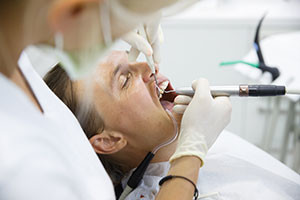 Trauma to the teeth often occur as a result of sports-related injuries or other accidents. The most common of these traumatic dental injures is chipped teeth, while the less frequent are knocked-out or dislodged teeth but are more serious. Dentists in Phoenix will tell you that any dental injury, no matter how mild it is, should immediately be seen by a specialist, called endodontist. Without proper oral exam, you might not be aware that the adjacent teeth are also suffering from an unnoticed injury. Endodontists are trained specialists who are experts in traumatic dental injuries. They have the extensive knowledge and skills, plus the right equipment and tools that are necessary to treat or save injured teeth.
Trauma to the teeth often occur as a result of sports-related injuries or other accidents. The most common of these traumatic dental injures is chipped teeth, while the less frequent are knocked-out or dislodged teeth but are more serious. Dentists in Phoenix will tell you that any dental injury, no matter how mild it is, should immediately be seen by a specialist, called endodontist. Without proper oral exam, you might not be aware that the adjacent teeth are also suffering from an unnoticed injury. Endodontists are trained specialists who are experts in traumatic dental injuries. They have the extensive knowledge and skills, plus the right equipment and tools that are necessary to treat or save injured teeth.
In this post, we discuss the common dental injuries and how these will be treated.
- Chipped (Fractured) Teeth
In most cases, this can be repaired by simply reattaching the broken piece or by placing a tooth-colored filing. An artificial crown or ‘cap’ may, however, be necessary if a significant portion of the tooth is affected. As for injuries to the back teeth – cracked, fractured or split – which extend to the roots, root canal treatment and a full coverage crown will be utilized to restore the tooth’s functionality.
In the case of damage or injury to the pulp, a root canal treatment will also be needed. On your way to the dentist, you can bite on a clean, moist gauze or cloth to help relieve pain. Never apply topical oral pain medications or directly place an aspirin tablet over the affected area because this can further damage the pulp.
- Knocked-Out (Avulsed) Teeth
When a tooth is completely removed from its support structures, time is very essential – you need to see the dentist immediately! Retrieve the tooth by holding it on its crown (exposed part) and never the root. If it’s dirty, do a quick rinse without using soap. Also do not brush or rub the tooth. Then, place it back on its socket if possible. If this cannot be done, it would be best to soak it in a glass of milk to prevent the root from drying. As an alternative, you can soak it in your saliva in a container or cup.
Depending on the overall condition of the tooth and stage of development, your endodontist will place a stabilizing splint, and may perform root canal treatment a week or two afterwards.
- Dislodged (Luxated) Teeth
Your tooth can also be pushed sideways, farther into its socket or out of it, but not completely knocked-out. In this case, you can try to reposition it back after calling your dentist for an appointment. For permanent tooth that has been dislodged, root canal treatment is usually needed. As for children aged seven to 12, a root canal may not be necessary as their teeth are still developing. Aside from medications like calcium hydroxide, a permanent root canal filling will also be placed at a later date.
- Root Fractures
A vertical or horizontal root fracture may also be possible as a result of a dental traumatic injury. The location and direction of the fracture determine the long term condition of the affected tooth. If the fracture is closer to the root, this has a better rate of success. If the fracture, on the other hand, is closer to the gums and is more vertical, its success rate is poorer. Thus, it is best to consult your dentist for more information.
These are the four common traumatic injuries to the teeth. If in the event that you experience any of these, no matter how mild you think it is, set an immediate appointment with an endodontist. Phoenix is a city that houses a lot of these professionals. We’ve got the best at Sky Dental Alliance.